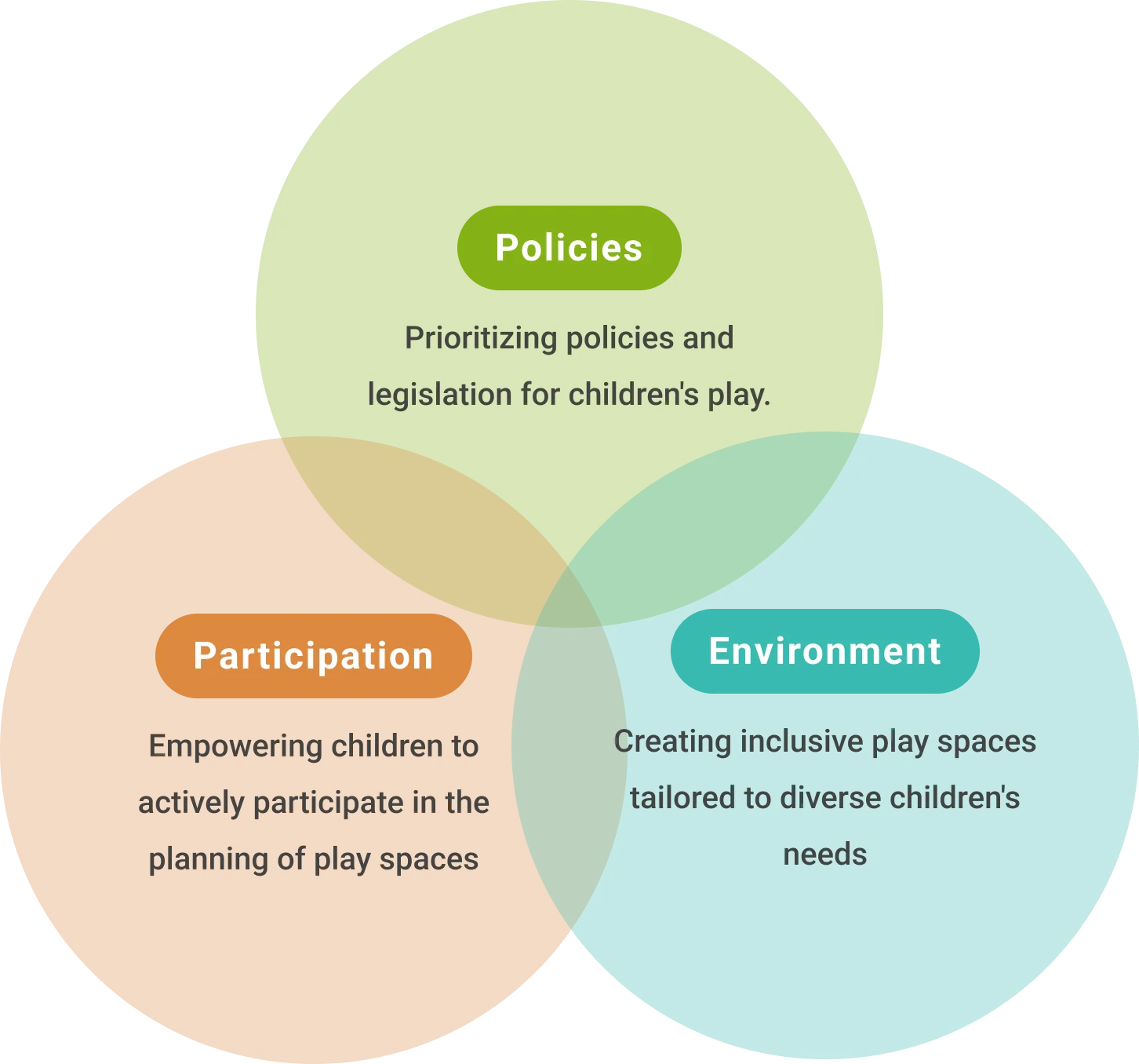Advocacy
Starting from a child's perspective,
discovering diverse voices and needs,
and opening up imaginations about play.
Why Is Play Essential for Children?
Play is an inherent ability in children, and it is a language they excel in.
Through play, they not only explore the world but also come to know themselves better.

Play can cultivate children’s resilience
when facing challenges.

Play teaches children
empathy and sharing

Play allows children to
express their emotions

Play helps children
communicate and interact with people

Play aids children in
self-discovery and exploring their interests

Games boost children's
physical and sensory integration development

Play can cultivate children’s resilience
when facing challenges.

Play teaches children
empathy and sharing

Play allows children to
express their emotions

Play helps children
communicate and interact with people

Play aids children in
self-discovery and exploring their interests

Games boost children's
physical and sensory integration development
Guarding childhood through play
Our Three Advocacy to promote
Children’s Right to Play

Prioritizing policies and legislation for children's play.
Safeguard children's play rights,
supporting a childhood filled with unrestricted play
Why advocate for children's play policies?
We continue to work towards making a play-friendly environment an integral part of the city's DNA!
Through international exchanges and interdisciplinary collaboration,
we gather experiences in transforming play spaces into a knowledge base to deepen our impact.

① Affordable childcare
With increasing focus on childcare policies, providing quality play spaces for children aged 0-18 is crucial.

② Reimagining the 'Digital Generation Childhood'
Amidst busy modern life, children's playmates are often limited to screens. Beyond play spaces, we need measures to ensure kids have ample space and time for play.

③ Play as a Fundamental Right
Whether in the UN Convention on the Rights of the Child or extensive child development research, the right to play is highlighted as crucial, akin to the right to survival, demanding protection and implementation.
Advocacy
Government must actively protect children's play rights,
not just regulate play area safety.
Taiwan's child play regulations focus on safety, overlooking the need for inclusive play experiences and child-friendly public spaces. We urge the government to actively champion 'Children's Play Rights,' aligning with the UN Convention on the Rights of the Child and implementing comprehensive policies at all levels.
Read More about Our Advocacy
Empowering children to participate in the planning of play spaces
Involving children in designing play spaces
from a user's perspective.
Why involve children in design?
"I want a really tall slide!"
"I want to climb like Spider-Man!"
Some worry that children's design ideas might be too imaginative to implement.
However, involving children in design doesn't make them designers; it makes them 'partners' with designers, creating fun play spaces together."

In Children’s Perspective
①Through both words and actions, children can practice communication and articulate their ideas during the design process
② Sensing the environment and materials on-site to open up diverse imagination and perception of play.

In Designer’s Perspective
① Gaining a deeper understanding of children's play behavior through direct participation and observation
② Enhancing understanding of the diverse aspects of play to discover tailored solutions for different settings
Advocacy
Establishing participatory design as a norm
to create playgrounds that truly meet children's needs
Games play a crucial role in children's lives, yet currently, they have little autonomy in shaping play spaces and struggle to express opinions during planning, often overlooked.
Therefore, we advocate for active government inclusion of children's voices in the process of constructing or renovating playgrounds, making participatory design a standard practice. Through this approach, we aim to delve into each child's inner world, ensuring play spaces genuinely cater to their perspectives and needs.
Read More about Our Advocacy
Ensure children with different needs can find suitable play environments
Creating more spaces that are "suitable for playing",
allowing children to discover more opportunities for enjoyable play.
Why do we need diverse play spaces?

2-3 years old
Through play, practicing coordination of
sensations and body movements.

4-6 years old
Through play, practicing coordination of
sensations and body movements.

7-12 years old
Through play, training physical abilities
and enhancing social experiences

2-3 years old
Through play, practicing coordination of
sensations and body movements.

4-6 years old
Through play, learn to engage in cognitive
operations and social interactions.

7-12 years old
Through play, training physical abilities
and enhancing social experiences
Advocacy
Listening to the gaming experiences of children of different ages and abilities to
create highly playable playgrounds.
The playgrounds we advocate for aren't just about vibrant colors or unique designs; the real key to stimulating children's development lies in the overall environment's 'playability' and 'challenge'! However, in Taiwan, playground spaces tend to 'overemphasize risk avoidance,' resulting in standardized play equipment and sacrificing the inherent playfulness of these spaces.
Therefore, we advocate for designing challenges based on children's play experiences, replacing standardized play equipment and providing playgrounds that meet children's physical and mental development needs, while also helping them explore the world and practice life skills!
Bringing games into more public spaces,
creating child-friendly, rich, and fun urban environments.
We believe that fun playgrounds are just the beginning of a 'playful city.' When games enter public spaces, combined with greenery, local characteristics, aesthetic education, etc., they become catalysts for richer and more diverse urban environments.
In addition to building age-appropriate and playable 'playgrounds,' we also hope to see more public spaces accommodating children's laughter and play. Because where games happen, children and everyone else can easily build relationships, awakening the friendly environment that children need and desire in the city.
